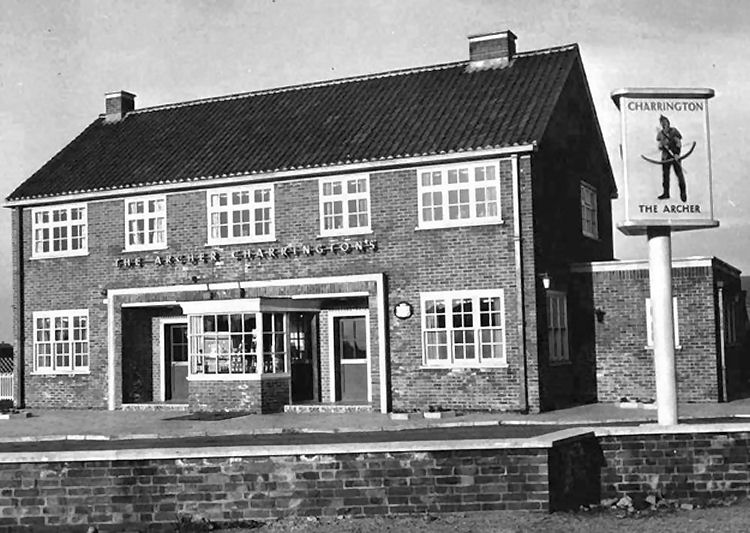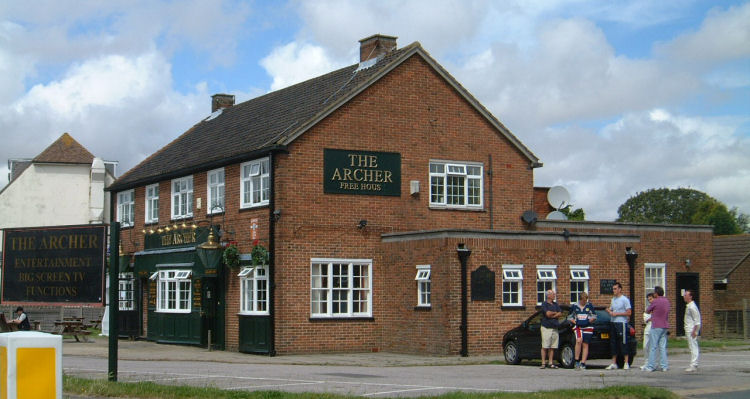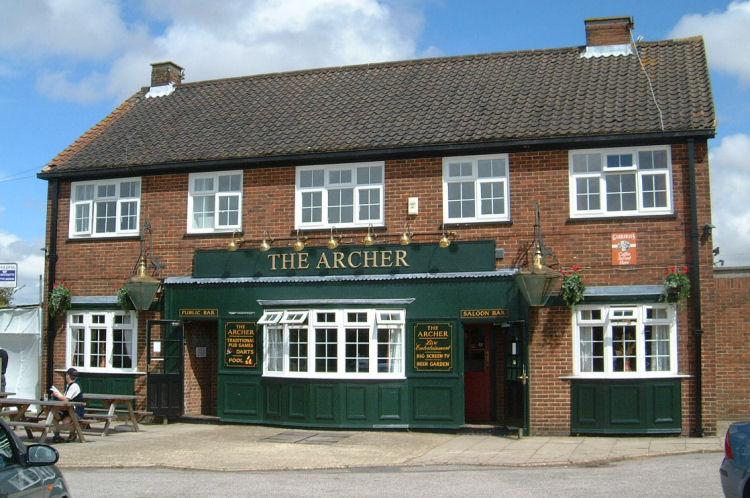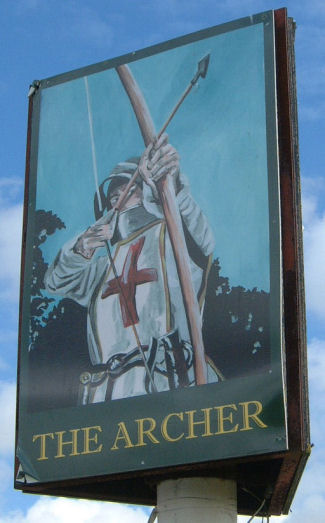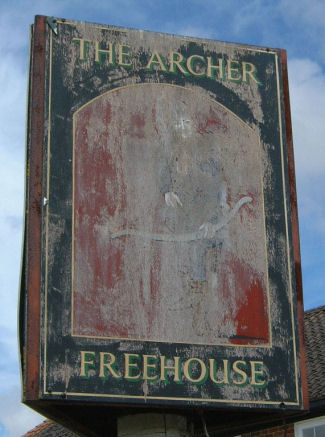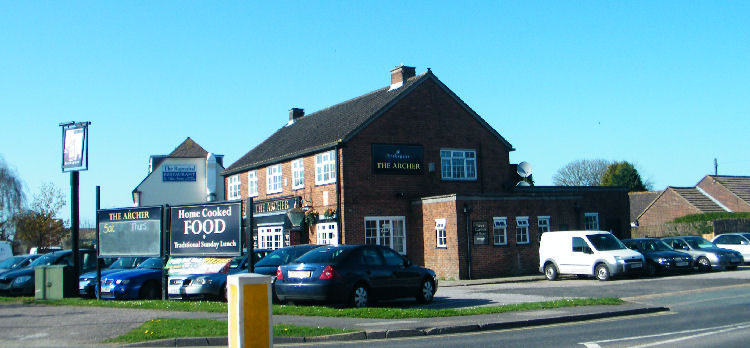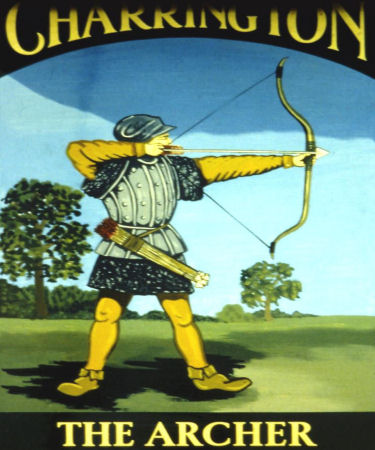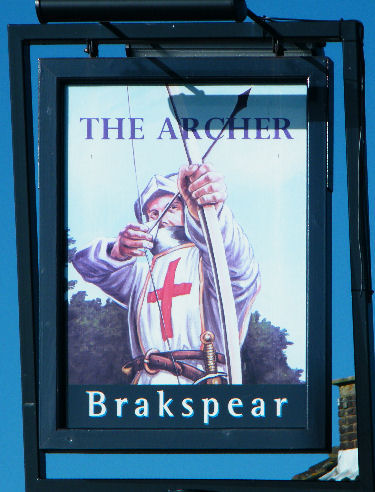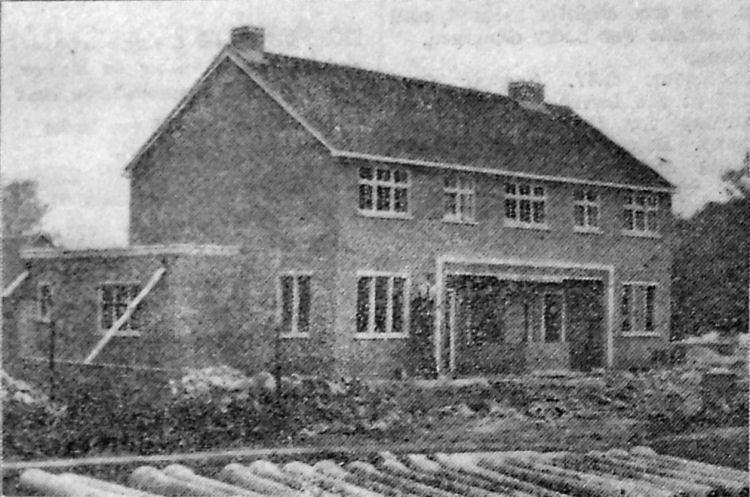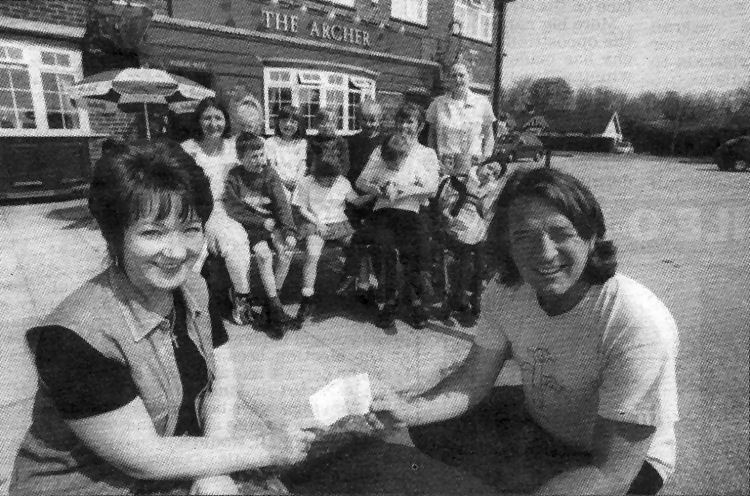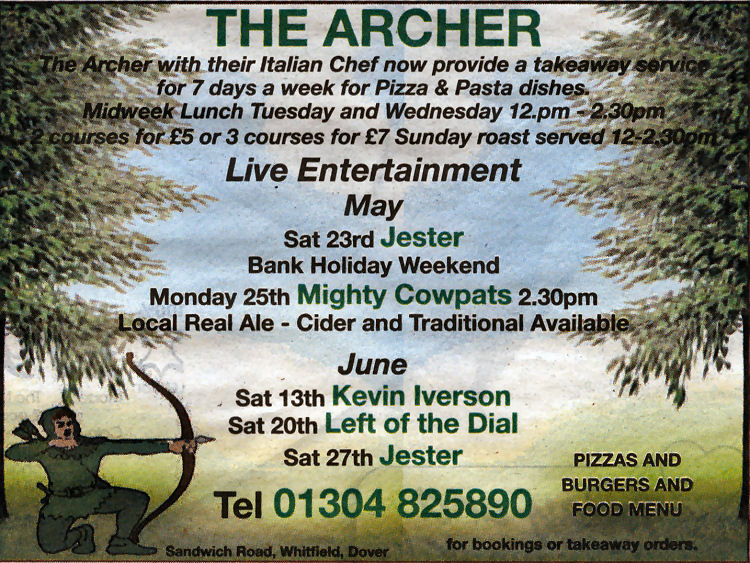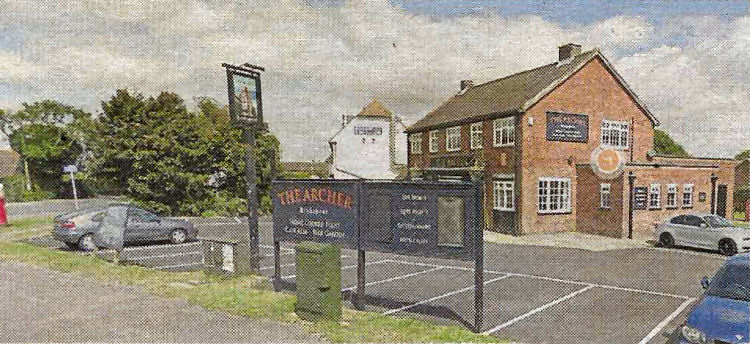|
From the Dover Express and East Kent News. 11 March, 1938. Price 1½d.
WINGHAM PETTY SESSIONS
The County Petty Sessions were held at Wingham on Thursday, before
Viscount Hawarden, Messrs. C. J. Burgess, W. G. Chandler, A. J.
Lailliott and C. W. Chitty and Mrs. Plumptry.
WHITFIELD LICENCE APPLICATION
Mr. B. H. Waddy (instructed by Messrs. Mowll and Mowll) applied on
behalf of Bertram Charles Dredge, Manager to Thompson and Sons Ltd.
Brewers, of Walmer, for a provisional licence for premises they desired
to erect at the top of Whitfield Hill.
Mr. P. Bracher (for Messrs. Fremlins, Ltd. Owners of the “Royal Oak,”
Whitfield, and the “Railway Hotel,” Kearsney,) Mr. E. E. Chitty (for a
number of residents and property owners), and Supt. Webb (for the
Police) appeared to oppose.
The Magistrates' Clerk said that there was also a letter from Mr.
Perkins, but he was not present.
Mr. Waddy said that the house was to cater for the road traffic that
went along the road from Dover to Sandwich, a main road, and for the
local inhabitants. Going from Dover to Sandwich one turned up the hill
and did not pass the “Railway Hotel” at all, yet they had come to oppose
the application. The “Royal Oak” was just under two-thirds of a mile
away and then came a beer house, another beer house at Tilmanstone and
then right through to Eastry. As regards the traffic that went along
that road the only census he had been able to get was one issued by the
Kent County Council in 1935. That gave figures of the traffic on
Whitfield Hill between August 12th and 18th, 1935, and it was common
knowledge that the motor traffic had very considerably increased since
then. In that week the total number of vehicles of all kinds, including
cyclists, was 8,851. the large majority of the vehicles were motor
vehicles. On each day there were more than one thousand. In fact 1,053
was the lowest on one day; the highest was 1,413 on Saturday, 17th
August. So they could see that there was a substantial amount of traffic
using the road and the only accommodation for them was the “Royal Oak”
in Whitfield itself. It was an old fashioned house. All the houses along
that road were almost certainly pre-war, some boasted some sort of
draw-in but none of them had anything in the nature of a real car park
and although the houses were well kept they were nothing like the modern
refreshment houses now being put up all over the country. The only house
in that district with any pretence to a car park was the “Railway Hotel”
and that was really off the route. There was a bus stop at the
applicant's site and they could make provision for people to wait there
in inclement weather. The majority of the houses, as shown by the map he
produced were nearer the applicant's site than the “Royal Oak.” The site
was an ideal one, very open, and the erection of buildings on it could
not possibly create a traffic problem. Upon that site, which was a big
one, the applicants proposed to build not only a licensed house but to
sell land at the site, for shops in front and garages behind, so that
the existing houses there were not going to look over into the
applicant's premises. Exactly opposite the corner were two shops and a
garage, so no one could complain that they were making a shopping centre
for the south end of the village. There were 225 houses in that
two-thirds mile radius and with the moderate figure of four persons per
house they got over one thousand people. The applicants could set the
house well back and form an ample car park with a splendid sight line
across the corner for traffic. Neither of the houses opposing the
application had such a pleasant elevation as the proposed one, and it
would really be an asset to the village of Whitfield. They were
proposing to have an off licence with a separate entrance, so that there
would be no need to go into the bars at all. There was to be a public
bar, private bar and saloon bar all connected with the service place and
on the right-hand side luncheon and tea rooms and conveniences both
sexes. The house would cost something in the neighbourhood of £3,000 to
erect, so the Justices would see that they were not running up some
little show. That amount was quite apart from the furnishings. He
mentioned that figure particularly for the benefit of property owners,
as they could not say it would destroy the amenities of the
neighbourhood at all. Then they must realise that a substantial portion
of that £3,000 must be spent in the locality and that was going to be a
great assistance to the rates. The property owners were a different
problem. They were constantly hearing at the licensing meetings of
residents coming forward frightened that their property was going to be
hurt by the coming of licensed premises in their district. That must be
the real nature of opposition from the property owners. He understood
that some of the objectors were residents but some of the owners of
building land were not owners of building land immediately adjacent to
the site of the proposed premises, because that belonged to the
applicants. Beyond that came a house and it must be 200 yards before
coming to any more real building land. In his submission, the proposed
premises would appreciate rather than depreciate the neighbourhood. It
would become the focus of the village because there would be shops and
the proposed house would become a small social centre of the village. It
was an extremely difficult thing to find out what people in the district
wanted, and although all sorts of criticism could be made about
petitions, one tried one's best to test the nature of the wishes of the
neighbourhood by means of a petition. His petition contained 119
signatures. He did not know how many Mr. Chitty had but he was
instructed that in three cases – and the petition in favour was made
after Mr. Chitty's people signed Mr. Chitty's because they thought it
was a petition for people in favour – the proposal and not against. It
only went to show that petitions had to be dealt with somewhat
leniently, but the fact that 119 people had taken the trouble to send a
petition in favour, it did go to show, in his submission, that in an
area like that, a house such as the applicants desired to erect would
really be welcomed by the people there. The monopoly value – the price
agreed between his clients and the Customs for submission to the
justices for approval – was the sum of £1,000.
John Bolsom, a retired Colour-Sergeant in the Royal Marines, living at
“Fairhaven,” Sandwich Road, Whitfield, said that he lived about one
hundred yards from the proposed site. He thought licensed premises such
as it was proposed to erect would be a considerable convenience to the
neighbourhood and he thought it was necessary. He had gone round with a
petition for more in favour , and was there that morning to support it.
The road to the “Royal Oak” was very dangerous as there were no lights
and no footpaths. The signatures were people living near the proposed
site; the village of Whitfield had not been touched at all as they had a
public house.
Mr. Bracher: Presumable, you are not a teetotaller?
Not buy any means.
Do you have any difficulty in getting what refreshments you require now?
No, but I have a lot of work to get one, and when I get home I feel I
want another one.
Mr. Chitty: Archer's Court Road is in the immediate neighbourhood, and
there are 20 houses there?
I should think more.
You think it would be a convenience to these owners and a necessity for
them to have this licence?
I certainly do.
Have they signed your petition?
I have not been to them.
You admit now that you have not asked the people in the immediate
neighbourhood?
I knew they were opposed to it, but they are only a small proportion.
Superintendent Webb: have you been to the “Royal Oak” since the premises
have been altered?
Yes.
During the time you have resided in Whitfield have you visited the
“Royal Oak” on many occasions?
Yes.
Have you ever found a greater demand for intoxicating liquor than they
could supply?
I have not.
Alexander French, Archer's Court House, Whitfield, a builder, gave
evidence supporting the application.
Mr. Bracher: You have not got a contract for the building of this new
house if it is erected?
Certainly not.
Mr. Chitty: Are all the houses in Archer's Court Road detached private
houses subject to restrictive covenants confining them to private
houses?
Yes.
So far, there have been no business premises on the other side of
Archer's Court Road and in the Sandwich Road the only premises are a
grocer's shop and a garage, which were erected at a time when a lot of
little bungalows were going up there without restrictions?
There have been proposals for business premises there.
But actually there have been no business premises?
No.
Superintendent Webb: Have you visited the “Royal Oak?”
Occasionally.
Have you found the demand so great that you could not be supplied?
No.
Mr. Bracher addressing the Bench on behalf of the owners of the “Royal
Oak,” Whitfield, and the “Railway Hotel,” Kearsney, said that the
application had been put before them on two different grounds, the needs
of the itinerant public and the needs of the resident public. The
application was for an entirely new licence, and there were no half
measures about it. The Justices would have to feel that there was a very
considerable need, a need proved to their satisfaction that it was
necessary to have an additional licence in their area before they
granted it. He was not preaching temperance, but one had to consider the
licensed houses in the area and whether there was need for an additional
one. As regards the residents, they had a petition there, and he would
point out that those 119 names were by no means independent of each
other, neither did they represent separate households. The first one was
John Bolsom, then somebody else by the same name, and then Mrs. Bolsom.
Then came Mr. F. E. Greenstreet and S. H. Greenstreet, and so forth, as
they looked down the list. If they put it that 119 names represented 50
different houses they would be generous to the applicants. One could not
always have a public house on the doorstep and when there was a bus
going by – they had heard from Mr. Waddy's figures that there were a
great number each day – so that it was no hardship for people to have to
take a penny bus ride-
Mr. Waddy: It makes a penny on a pint of beer.
Mr. Bracher, continuing, said that as regards an off-licence, in these
days of competition the licensees of the houses in the district were
quite willing to deliver any alcoholics in their area. So much for the
local inhabitants. With regard to the through traffic, the whole
distance from Dover to Sandwich was some twelve miles. Within
three-quarters of a mile of Dover there was the “Royal
Oak,” Whitfield;
how many minutes run in a car was this? Then it was not very far by car
before they got to Eastry, and a little further on was Sandwich. Was it
coming that the motoring public had got to have a licensed house every
mile along the road? As regards the “Railway Hotel,” they might consider
that some of the traffic would be coming from the Canterbury direction,
and so would pass the “Railway Hotel” before going up Whitfield Hill.
The “Royal Oak” had had a considerable amount of money spent on it
already and had ample refreshment rooms. He had to say that there was no
evidence of the necessity for an additional licence, either from the
point of view of local inhabitants or the itinerate public.
Mr. E. E. Chitty said that he appeared for the owners and lessees of the
better class houses in the immediate neighbourhood and vicinity of the
proposed public houses, and they objected very emphatically. He had a
petition signed by 66 people representing 27 houses and people owning
land. The owners of nearly all the houses in the vicinity subsequently
decided to instruct him to oppose the application. With regard to the
traffic the argument was absolutely absurd, as no motorist leaving Dover
would want a drink at the top of Whitfield Hill. If he did want a drink
it would only mean him going another three-quarters of a mile along the
road. His client objected very emphatically to having a number of people
dragged from other towns to come and have a drink next door to them.
They did not want “gay young things” to go out there to make whoopee-
Mr. Waddy: We are not catering for them.
Mr. Chitty said that he did not see who else they were catering for. It
had been said that the public house would be an asset and an
improvement, but it was curious that none of the people who ever stated
that, whether it be Counsel, brewers' managers, or anyone else, lived
next door to a public house, and found it improved the neighbourhood. He
had never found that yet.
Mr. Waddy: I must interrupt, as my friend has said that, and referred to
me. I have lived for fourteen years next door to a public house and I
had my house built there. (Laughter.) If my friend makes a personal
reference I must answer it.
Mr. Chitty: My friend must be an exception. Continuing, Mr. Chitty said
that the class of people in the neighbourhood of the site were the class
of people who did not require a public house. They obtained all the
liquor they wanted by giving an order to their brewer or wine merchant;
they did not send their wife across the street with a mug. (Laughter.)
It was a very good principle that existing licensees should not be
subjected to such competition as would make it extremely difficult for
them to make a living whilst conducting their houses strictly within the
law. The licensee of the “Royal Oak” had conducted his house very well,
he was an enterprising man, and had given satisfaction to all his
customers. The policy of the licensing laws was that there should be a
comparatively small number of well conducted houses able to get a living
nicely. As regards the wording of the objection-
The Chairman: Who drew it up?
Mr. Chitty: I did myself, after consultation with my clients.
Mr. Chitty went on to read the objections, which were that there were
ample facilities for obtaining alcoholic refreshments already existing,
and any additional licences would be contrary to public interest and
prejudicial to the amenities of the neighbourhood. Their houses were
good class residential properties, and the houses on the side of the
road were subject to a restrictive clause. The erection of a public
house on the site proposed would seriously impair the amenities of the
area.
Patrick Joseph Callanan, a clerk employed by Messrs. Bradley, Chitty and
Scorer, gave evidence for collecting the names on the petition for the
objectors.
Mr. Waddy: Look at the address “Valley View,” Sandwich Road, there are
three people under the name of that house. Did you get those signatures?
Yes.
Look at my petition, there are the same names?
Yes.
What did you tell these people?
I put it to them that I was from the office of Bradley, Chitty and
Scorer, and we were concerned with the opposition to the public house
licence.
Did you get them to read your objections?
Anyone who wished to.
Did you not insist on them reading it?
I simply explained we were opposing the licence. One or two, or three,
went to the trouble of reading it.
Mr. Chitty said that in regard to the persons in “Valley View,” he had a
letter from Mrs. R. Harris on March 15th, addressed to his firm,
stating, “Please include my name amongst those opposing Mr. Dredge's
application.”
Superintendent Webb said that the Police were opposing the application
on the grounds that the existing premises in that district were
sufficient to meet the requirements.
The Chairman after the Magistrates had retired to consider their
decision, said that there were not sufficient grounds for the erection
of a new house, so that the application would be refused.
|
